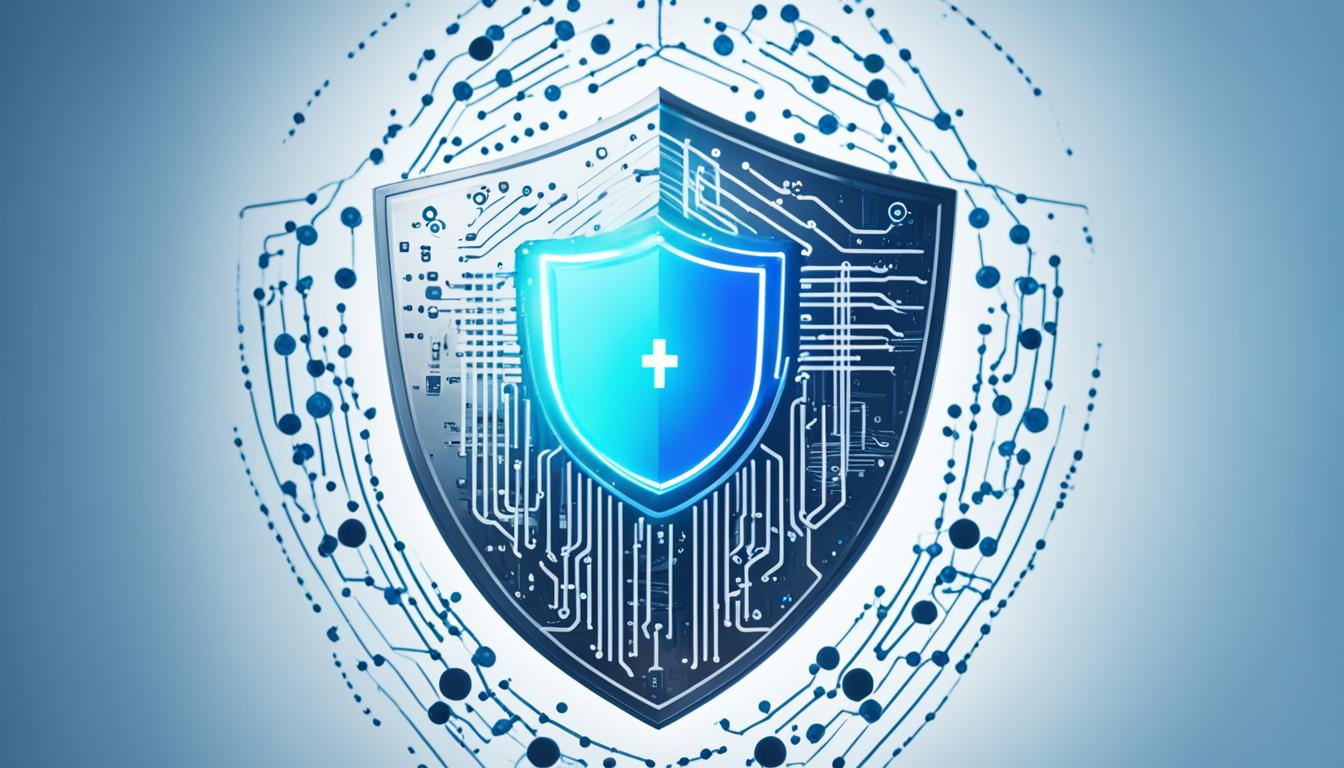
Welcome to my blog about AI and cryptography. In our digital world, keeping data safe and communication secure is key. AI helps make cryptographic systems stronger against new threats. This ensures our information stays private and unchanged.
AI in cryptography is used in many ways. It helps create better encryption, secure keys, detect intrusions, and ensure data privacy. By using AI, like neural networks, we make encryption stronger and cryptographic processes more robust.
Why is AI in cryptography so important? It makes security better, finds threats faster, and adapts to new challenges. Imagine encryption that updates itself against new threats. Or AI that can quickly find and stop security risks. Innovations like neural cryptography and quantum-resistant encryption are exciting examples of what AI brings to the field.
However, using AI in cryptography has its hurdles. We face issues like attacks from hackers, limited resources, privacy worries, and ethical questions. But, facing these challenges lets us fully use AI in cryptography to keep our digital world secure.
Key Takeaways:
- AI cryptography combines artificial intelligence with cryptographic systems to enhance security and protect against emerging threats.
- It offers benefits such as enhanced security, efficient threat detection, and adaptability to emerging threats.
- Challenges in implementing AI cryptography include adversarial attacks, resource constraints, privacy concerns, ethical considerations, and scalability.
- Addressing these challenges is crucial to harnessing the full potential of AI cryptography in securing our digital world.
AI vs. Traditional Cryptography: What Sets Them Apart?
Traditional cryptography has been our main tool for securing communication. It uses set symbols and methods to safeguard data. Today, as technology quickly evolves, we need even better security. This need has led to the rise of AI cryptography.
AI cryptography puts together artificial intelligence and traditional methods to boost security. It brings to the table dynamic encryption. This means it doesn’t stick to one method. Instead, it can change encryption techniques as threats evolve. This makes it tougher for attacks to succeed.
AI is also great at looking through huge amounts of data quickly. Because of this, AI cryptography is better at finding and dealing with threats. It spots unusual patterns and can act fast to protect against dangers.
“AI cryptography offers dynamic encryption that can automatically update encryption methods, enhancing security against evolving threats.”
Aside from better security, AI cryptography has other perks. It keeps private information safe and works well on a large scale. It’s also ready for future threats, like those from quantum computers.
But, using AI cryptography comes with challenges. There’s a risk of adversarial attacks, where bad guys find and use loopholes. To fight this, we need strong AI models and training. There are also worries about having enough resources and scalability.
Keeping data private is another big issue. AI cryptography must protect user privacy without losing sensitive information. There are also ethical issues. We must use AI and cryptography in a clear and fair way.
AI vs. Traditional Cryptography: A Comparison
Let’s look at how AI and traditional cryptography differ:
| Features | Traditional Cryptography | AI Cryptography |
|---|---|---|
| Data Protection | Relies on fixed encryption techniques | Offers dynamic encryption with automatic updates |
| Security | Provides a level of security but is less adaptive to evolving threats | Enhances security through AI algorithms for threat detection |
| Threat Detection | Depends on manual monitoring and analysis | Utilizes AI algorithms for efficient threat detection and response |
| Privacy | Provides privacy but may be limited in terms of adaptability | Improves privacy with AI-powered analysis and protection |
| Scalability | Can be limited in scalability due to fixed methods | Highly scalable for large-scale deployment |
| Adaptability | Not specifically designed to adapt to quantum threats | Offers adaptability to quantum threats for future-proof security |
AI cryptography makes big improvements in how we protect data and handle threats. It also does a better job at keeping information private and is ready for the future. Still, it’s important to tackle its challenges. We need to think about adversarial attacks, resources, scalabilty, privacy, and ethics.
Next, I’ll take a closer look at these challenges and suggest ways to solve them.

Challenges and Considerations in Implementing AI Cryptography
Using AI in cryptography brings unique challenges. One main issue is the risk of adversarial attacks. These attacks happen when bad actors find weak spots in AI models and cryptographic systems. To fight this, we need strong defenses, like adversarial training. This will help protect our systems and keep them secure.
Another key factor is how well AI algorithms perform. While they can make systems more secure, they also require a lot of computing power. This can slow things down. It’s important to find a good balance. We need to keep our systems fast and efficient while still protecting them.
Protecting private data is also crucial in AI cryptography. Techniques like differential privacy help keep personal information safe. They ensure that we can enjoy the benefits of AI without risking our privacy. As we mix AI with cryptography, we also have to think about ethics. We must use AI in a way that is transparent and doesn’t harm people’s rights.
Finally, making sure AI cryptography works well across different platforms is important. We need to set industry standards and make systems that work well together. This will help AI cryptography become more widely used. It will also prevent problems caused by incompatible systems.
FAQ
What is AI cryptography?
What are the applications of AI cryptography?
What are the benefits of AI cryptography?
What challenges are faced in implementing AI cryptography?
How does AI cryptography differ from traditional cryptography?
How does AI cryptography improve security?
What challenges are faced in deploying AI cryptography?
What are adversarial attacks in AI cryptography?
What considerations should be made for performance and efficiency in AI cryptography implementation?
How is data privacy addressed in AI cryptography?
What ethical and legal implications arise from the fusion of AI and cryptography?
Why is standardization and interoperability important in AI cryptography?
How does AI cryptography enhance security and protect sensitive information?
Source Links
- https://medium.com/@singularitynetambassadors/ai-cryptography-enhancing-security-and-privacy-in-the-digital-age-db5c1bbf5fdb
- https://www.linkedin.com/pulse/enhancing-security-fusion-ai-cryptography-shaik-arif
- https://www.linkedin.com/pulse/ai-cryptography-uncovering-benefits-real-world-use-cases-ian-perez-dumgc






